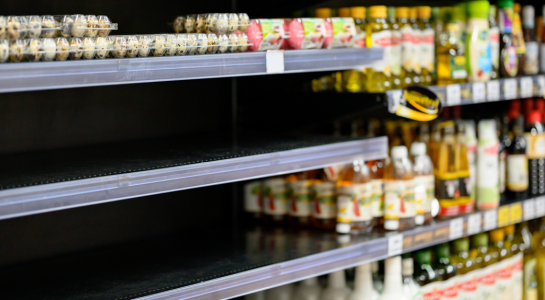Farmers' 'risky' shift threatens shortages at your favourite supermarkets!
By
- Replies 95
As we navigate the aisles of our beloved supermarkets, Coles, Woolworths, and Aldi, we've all felt the sting of shortages in one form or another.
But recently, a new concern has emerged that could potentially exacerbate these shortages, particularly regarding one of the staples in our kitchens: eggs.
The issue is a significant shift in farming practices, specifically how we farm chickens, which some experts warn could put our egg supply at even 'greater risk.'
In July, the avian influenza H7N3 hit the poultry industry hard, leading to the culling of tens of thousands of hens across New South Wales and Victoria.
This outbreak caused a noticeable absence of eggs on the shelves of our major supermarkets.
The virus, found in different variants in each state, is believed to have spread through contact with wild birds.
This is particularly concerning for free-range chickens, which are more exposed to wild birds and, consequently, to the virus than those housed indoors under strict biosecurity measures.
In response to this threat, Russia has proposed banning free-range eggs by March 2025.
Australia, however, is taking a different path. The nation is set to phase out traditional cage egg farming by 2036.
The cramped conditions of traditional cages, which offer each hen about as much space as a sheet of A4 paper, have long been a point of contention.
Yet, the Egg Farmers of Australia, the industry's representative body, has raised questions about the timing and implications of this transition.
CEO Melinda Hashimoto of Egg Farmers of Australia expressed concern about the potential for further insecurity in the nation's egg supply, given the recent avian influenza outbreaks.
‘We can see with avian influenza that if a large number of birds are impacted, there is a reduction in eggs in the marketplace, and this is without factoring in that government plans to phase out one production system,’ she said.
The debate has even seen a resurgence of demand for cage eggs among consumers, who perceive them as safer despite no evidence that the virus can be transmitted through thoroughly cooked eggs.
Hashimoto suggested that governments should reconsider their priorities and focus on production systems that provide affordable protein and food security.
‘Farmers feel that with government phasing out cages they have been pushed into accepting a production system of greater risk,’ Hashimoto stated.
‘It is supermarkets and animal welfare groups that want free range or cage free eggs, and yet when avian influenza impacts our industry it is industry and government that pays for the response.’
The Federal Department of Agriculture (DAFF) remains confident that its biosecurity practices can manage the current H7N3 outbreaks.
‘The national layer hen flock has been impacted by these outbreaks, and there is some localised disruption to supply noting this is considered manageable in the context of overall national supply,’ they said.
While traditional cages will be phased out, 'enriched' cages and indoor barn systems will still be permitted.
However, the department has not specifically addressed whether free-range systems pose a higher risk for the spread of avian influenza.
Animal welfare groups and opponents of industrialized farming argue that the close confinement of chickens in cage systems creates an ideal environment for viruses to mutate into deadly strains.
Chris Delforce, founder of Farm Transparency Project, has called large-scale commercial farming a 'biosecurity disaster waiting to happen,' highlighting the potential for disease outbreaks to devastate wildlife.
‘These places are breeding grounds for all sorts of novel diseases… the potential for one of these inevitable outbreaks to decimate our wildlife cannot continue to be ignored,’ he explained.
Infectious disease experts abroad, like Dr. Jenna Guthmiller from The University of Colorado Anschutz Medical Campus, have expressed concerns about the adequacy of surveillance measures to prevent the spread of viruses like H5N1.
‘Not enough surveillance is going on. I think we’re catching some of these outbreaks towards the tail end. And that’s really where my concerns lie,’ she said.
 Have you noticed the egg shortages? What are your views on the shift towards cage-free egg farming? Join the conversation and let us know in the comments below.
Have you noticed the egg shortages? What are your views on the shift towards cage-free egg farming? Join the conversation and let us know in the comments below.
But recently, a new concern has emerged that could potentially exacerbate these shortages, particularly regarding one of the staples in our kitchens: eggs.
The issue is a significant shift in farming practices, specifically how we farm chickens, which some experts warn could put our egg supply at even 'greater risk.'
In July, the avian influenza H7N3 hit the poultry industry hard, leading to the culling of tens of thousands of hens across New South Wales and Victoria.
This outbreak caused a noticeable absence of eggs on the shelves of our major supermarkets.
The virus, found in different variants in each state, is believed to have spread through contact with wild birds.
This is particularly concerning for free-range chickens, which are more exposed to wild birds and, consequently, to the virus than those housed indoors under strict biosecurity measures.
In response to this threat, Russia has proposed banning free-range eggs by March 2025.
Australia, however, is taking a different path. The nation is set to phase out traditional cage egg farming by 2036.
The cramped conditions of traditional cages, which offer each hen about as much space as a sheet of A4 paper, have long been a point of contention.
Yet, the Egg Farmers of Australia, the industry's representative body, has raised questions about the timing and implications of this transition.
CEO Melinda Hashimoto of Egg Farmers of Australia expressed concern about the potential for further insecurity in the nation's egg supply, given the recent avian influenza outbreaks.
‘We can see with avian influenza that if a large number of birds are impacted, there is a reduction in eggs in the marketplace, and this is without factoring in that government plans to phase out one production system,’ she said.
The debate has even seen a resurgence of demand for cage eggs among consumers, who perceive them as safer despite no evidence that the virus can be transmitted through thoroughly cooked eggs.
Hashimoto suggested that governments should reconsider their priorities and focus on production systems that provide affordable protein and food security.
‘Farmers feel that with government phasing out cages they have been pushed into accepting a production system of greater risk,’ Hashimoto stated.
‘It is supermarkets and animal welfare groups that want free range or cage free eggs, and yet when avian influenza impacts our industry it is industry and government that pays for the response.’
The Federal Department of Agriculture (DAFF) remains confident that its biosecurity practices can manage the current H7N3 outbreaks.
‘The national layer hen flock has been impacted by these outbreaks, and there is some localised disruption to supply noting this is considered manageable in the context of overall national supply,’ they said.
While traditional cages will be phased out, 'enriched' cages and indoor barn systems will still be permitted.
However, the department has not specifically addressed whether free-range systems pose a higher risk for the spread of avian influenza.
Animal welfare groups and opponents of industrialized farming argue that the close confinement of chickens in cage systems creates an ideal environment for viruses to mutate into deadly strains.
Chris Delforce, founder of Farm Transparency Project, has called large-scale commercial farming a 'biosecurity disaster waiting to happen,' highlighting the potential for disease outbreaks to devastate wildlife.
‘These places are breeding grounds for all sorts of novel diseases… the potential for one of these inevitable outbreaks to decimate our wildlife cannot continue to be ignored,’ he explained.
Infectious disease experts abroad, like Dr. Jenna Guthmiller from The University of Colorado Anschutz Medical Campus, have expressed concerns about the adequacy of surveillance measures to prevent the spread of viruses like H5N1.
‘Not enough surveillance is going on. I think we’re catching some of these outbreaks towards the tail end. And that’s really where my concerns lie,’ she said.
Key Takeaways
- Egg purchases at Australian supermarkets have been limited due to the spread of avian influenza affecting supply.
- Some farmers are concerned that phasing out traditional cage egg farming for animal welfare reasons could threaten the nation's egg supply.
- Australia planned to phase out traditional cage egg farming by 2036 and move towards free-range or enriched cage systems, but there are debates regarding the biosecurity risks involved.
- The Department of Agriculture believes current biosecurity measures can manage outbreaks, but there is contention over whether industrialised farming practices contribute to the risk of disease spread.








